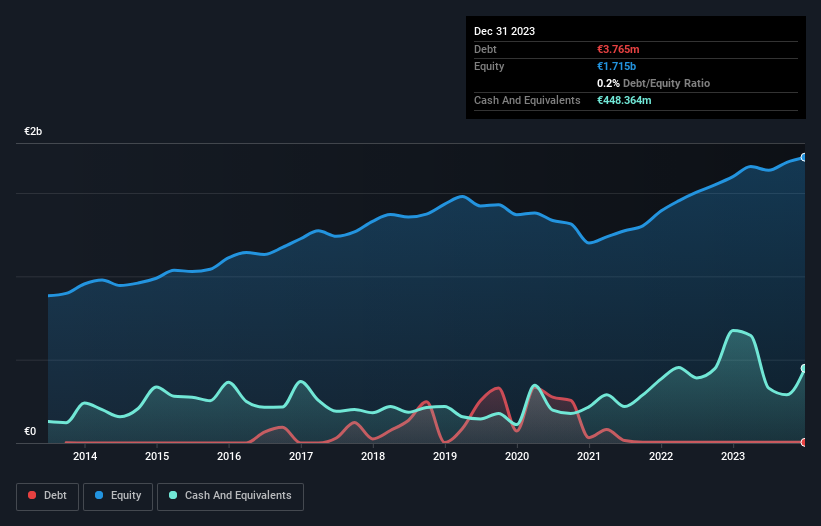
David Iben put it well when he said, 'Volatility is not a risk we care about. What we care about is avoiding the permanent loss of capital.' So it seems the smart money knows that debt - which is usually involved in bankruptcies - is a very important factor, when you assess how risky a company is. Importantly, Krones AG (ETR:KRN) does carry debt. But should shareholders be worried about its use of debt?
When Is Debt A Problem?
Debt assists a business until the business has trouble paying it off, either with new capital or with free cash flow. In the worst case scenario, a company can go bankrupt if it cannot pay its creditors. However, a more frequent (but still costly) occurrence is where a company must issue shares at bargain-basement prices, permanently diluting shareholders, just to shore up its balance sheet. Of course, the upside of debt is that it often represents cheap capital, especially when it replaces dilution in a company with the ability to reinvest at high rates of return. The first step when considering a company's debt levels is to consider its cash and debt together.
View our latest analysis for Krones
What Is Krones's Net Debt?
You can click the graphic below for the historical numbers, but it shows that Krones had €3.77m of debt in December 2023, down from €5.00m, one year before. But on the other hand it also has €448.4m in cash, leading to a €444.6m net cash position.

A Look At Krones' Liabilities
According to the last reported balance sheet, Krones had liabilities of €2.35b due within 12 months, and liabilities of €410.2m due beyond 12 months. On the other hand, it had cash of €448.4m and €1.84b worth of receivables due within a year. So its liabilities outweigh the sum of its cash and (near-term) receivables by €473.9m.
Since publicly traded Krones shares are worth a total of €3.98b, it seems unlikely that this level of liabilities would be a major threat. However, we do think it is worth keeping an eye on its balance sheet strength, as it may change over time. While it does have liabilities worth noting, Krones also has more cash than debt, so we're pretty confident it can manage its debt safely.
On the other hand, Krones's EBIT dived 13%, over the last year. If that rate of decline in earnings continues, the company could find itself in a tight spot. When analysing debt levels, the balance sheet is the obvious place to start. But ultimately the future profitability of the business will decide if Krones can strengthen its balance sheet over time. So if you want to see what the professionals think, you might find this free report on analyst profit forecasts to be interesting.
Finally, a company can only pay off debt with cold hard cash, not accounting profits. While Krones has net cash on its balance sheet, it's still worth taking a look at its ability to convert earnings before interest and tax (EBIT) to free cash flow, to help us understand how quickly it is building (or eroding) that cash balance. During the last three years, Krones produced sturdy free cash flow equating to 66% of its EBIT, about what we'd expect. This free cash flow puts the company in a good position to pay down debt, when appropriate.
Summing Up
While Krones does have more liabilities than liquid assets, it also has net cash of €444.6m. So we don't have any problem with Krones's use of debt. When analysing debt levels, the balance sheet is the obvious place to start. However, not all investment risk resides within the balance sheet - far from it. Be aware that Krones is showing 2 warning signs in our investment analysis , and 1 of those doesn't sit too well with us...
Of course, if you're the type of investor who prefers buying stocks without the burden of debt, then don't hesitate to discover our exclusive list of net cash growth stocks, today.
Valuation is complex, but we're helping make it simple.
Find out whether Krones is potentially over or undervalued by checking out our comprehensive analysis, which includes fair value estimates, risks and warnings, dividends, insider transactions and financial health.
View the Free AnalysisHave feedback on this article? Concerned about the content? Get in touch with us directly. Alternatively, email editorial-team (at) simplywallst.com.
This article by Simply Wall St is general in nature. We provide commentary based on historical data and analyst forecasts only using an unbiased methodology and our articles are not intended to be financial advice. It does not constitute a recommendation to buy or sell any stock, and does not take account of your objectives, or your financial situation. We aim to bring you long-term focused analysis driven by fundamental data. Note that our analysis may not factor in the latest price-sensitive company announcements or qualitative material. Simply Wall St has no position in any stocks mentioned.

Simply Wall St
About XTRA:KRN
Krones
Krones AG, together with its subsidiaries, engages in the planning, development, and manufacture of machines and lines for the production, filling, and packaging technology in Germany and internationally.
Flawless balance sheet and good value.
